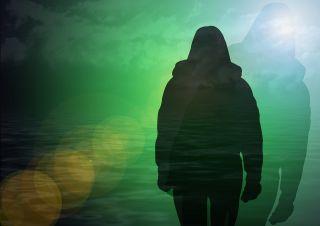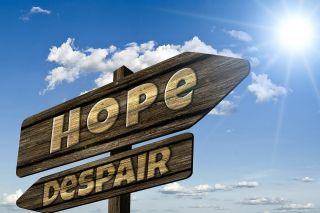Suicide Alert: The Spring Season Can Be Deadly
Suicide rate spikes in the season of rebirth and renewal.
Not everyone is feeling "Spring Fever"
Spring is here! Flowers are in bloom, birds are chirping, the sun is shining, the days are longer and people are more energetic and seemingly in a happier place. Spring awakens the senses. However, not everyone is feeling alive and refreshed. Spring also brings about a drastically high suicide rate, especially among teenagers and the elderly.

For people suffering from chronic illness, varying forms of depression or even grief, it will take much more than birdsong and sunshine to alleviate their feelings of hopelessness and despair.
During the colder, shorter, darker days of winter when everyone seems to be in a collectively blue mood, it is easy for sufferers of any of the symptoms of depression to blame their depression on the winter doldrums, expecting to feel better come spring.
However, if you are suffering from depression it can be quite distressing when winter gives way to spring - the season of renewal, and all living creatures start to "come alive" once again, but you are filled with sadness and pain, and feel as though you’re sinking deeper into a dark hole, beginning to wonder what more there it to life.
These feelings can cause depression symptoms to heighten and many sufferers turn to drugs and alcohol in an attempt to soothe their searing pain, but this leaves them feeling worse and even more isolated. As the sun rises the next day, the darkness of the previous night lingers, hanging over them like a dark cloud.
A depressed person has a difficult time finding pleasure in the activities they once enjoyed. So while their friends and loved ones revel in the glorious days of spring and all the joy the season brings - from baseball, graduations, and weddings to bike rides and picnics in the park - they feel like they are watching from the sidelines, desperate and alone.
This is why, unfortunately, the sunny days of spring have the highest rate of suicide.
⇒ If you or someone that you know is having suicidal thoughts or are in crisis, please call 1-800-273-TALK (8255), or visit National Suicide Prevention Lifeline.
Suggested Treatment Methods
At Dr. Diane® Brain Health we use my 5-Prong Approach to find the treatment methods that are best suited for the individual's needs, regardless of the presenting problem or situation. We view each person from the five distinct views that make up our approach: physical, psychological, emotional, spiritual and energy to help them overcome symptoms and regain their life using the following treatment methods.
These methods are effective in treating depression and can provide relief through difficult times.
Psychopharmacology: Symptoms of depression, especially those that bring about suicidal thoughts, tend to improve when traditional psychotherapy and cognitive behavioral therapy are used alongside appropriate medications.
Psychotherapy: Also known as “talk therapy”, is one of the most common and effective treatments for psychiatric disorders. Psychotherapy can increase the sense of well-being and can better manage discomfort or distress. Psychotherapy is very effective in decreasing suicidal thoughts, especially when used in conjunction with psychopharmacology.
Biofeedback and Neurofeedback: Methods that utilize information gained by monitoring skin temperature, blood pressure, heart rate, and other body conditions to encourage control over the normally involuntary nervous system through conditioning and relaxation.
CES Machine (Cranial Electrotherapy Stimulation): an FDA approved device to treat depression, anxiety and insomnia. It quiets the over-stimulated (reactivity) of the area of the brain (Limbic System), where the symptoms of anxiety, sleep problems, depression, andchronic pain are focused.
Massage: a relaxing and rejuvenating treatment, especially when you are experiencing symptoms of depression. Massage reduces tension in all parts of the body, promoting better sleep and greater overall well-being.
Nutrition Education: A balanced diet is not only necessary for optimal body function, but is crucial for optimal brain function as well. Eating foods that are not beneficial for your brain, such as sugar and alcohol, keep your brain from working at its best possible level and may greatly affect your moods. Proper diet, including brain healthy foods, can alleviate symptoms of depression, especially if you have had a traumatic brain injury, such as a concussion, stroke, or aneurysm.
Acupuncture: a complementary approach used in traditional Chinese Medicine. Acupuncture, like all energy healing methods, uses the body’s own qi (natural energy flow) to restore the body’s natural energy balance.
Reiki: a method of energy healing that is currently practiced all over the world and gaining in popularity. Reiki utilizes a natural universal energy that helps to balance the client’s system and assists healing at all levels. Because it is relaxing and supports the healing process, it can help treat a wide variety of issues, such as depression. Reiki is also effective for stressreduction, for increasing overall vitality, and for treating injuries.
Qi Gong and Polarity Therapy:
Qigong is a system of exercise developed in China that incorporates physical postures, breathing techniques, and focused intentions to balance the energy in the body to alleviate various symptoms, such as those involved with depression.
Polarity therapy is a natural healthcare system based on the idea that each individual has an internal blueprint that forms the bases of every aspect of life, including personal achievement and illness. The goal of this system is to target specific blocks in an individual’s internal energy, and then treat the consequential symptoms by getting the person to become more in tune with their internal blueprint. When the body has returned to a balanced state, it is better able to heal itself.
Homeopathic Remedies: Homeopathy, a form of alternative medicine, is based on the view that symptoms provide information about the body’s attempts to heal itself. Homeopathic treatment involves the use of remedies that are made from naturally occurring substances, that would cause particular symptoms if taken in large amounts, but that stimulate the curing of those same symptoms if taken in minute amounts in a highly diluted form. It is important to have a customized homeopathic treatment plan created for each individual, based on their own personal needs and symptoms.
Bach Flower Remedies: Dr. Bach discovered that certain flowers emit frequencies that effect specific symptoms, such as anxiety (remedy: Aspen) or racing thoughts (remedy: White Chestnut), and known fears (remedy: Mimulus). From his training in homeopathy he discovered that each of the 38 flowers essences, which are the frequencies, match specific symptoms. It is important to work with a Bach Flower Practitioner to create a customized Bach Flower treatment plan for your specific symptoms.
Stop Hurting. There is Help and Hope.

No comments:
Post a Comment